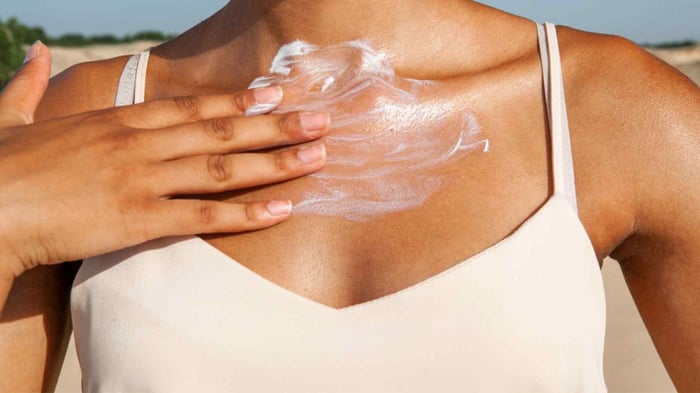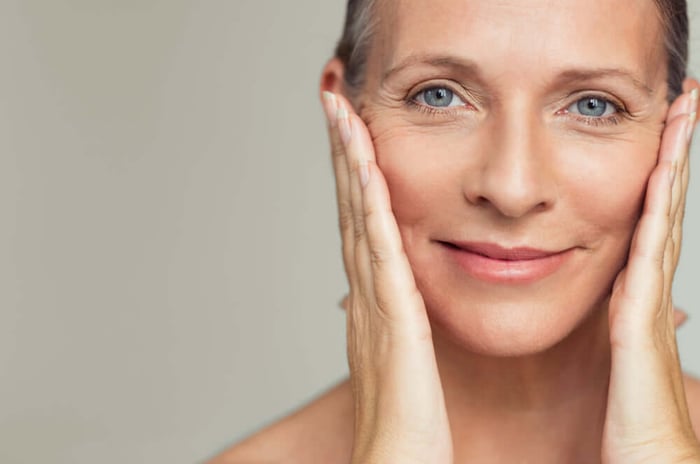Skin cancer is very real, a every summer we are faced with choosing a sunscreen to protect ourselves. To make things more difficult, the market is flooded with so many options! Plus, it doesn't help that most of the ingredients read to us like something in a foreign language.
While sunscreens help keep our skin looking young and healthy, its most important use is to prevent skin cancer, which is becoming increasingly common.
Skin Cancer at a Glance

Every day, some 9.500 people are diagnosed with skin cancer, according to the American Academy of Dermatology. Those are scary numbers.
There are three main categories of skin cancer: squamous cell carcinoma, basal cell carcinoma, and melanoma, with more rare types being Merkel cell tumors and dermatofibrosarcoma protuberans.
When preventing skin cancer, it’s important to focus on two things: what we put on our skin and what we put in our bodies.
Registered dietician and skin cancer survivor Anne Cundiff recommends increasing your consumption of lycopene-rich foods to help prevent skin cancer. She explains: “This powerful antioxidant found in reddish colored fruits tends to act as a natural sunscreen, providing an SPF of 3 or 4 from the inside out. In addition, lycopene helps your skin act as a natural filter, allowing enough sunlight through for your body to produce vitamin D.”
Foods That Protect Your Skin

Sometimes it's not about what you put on your skin, but what you eat as well. These foods are proven to fortify the skin and strengthen its defenses against aggressors like the sun.
Focus on preparing meals that include the following foods to up your body's natural production of SPF to protect yourself from skin cancer.
To prevent or heal skin cancer, try preparing meals that contain:
- Beta-carotene (carrots, kale, mango, spinach, squash, and sweet potato)
- Curcumin (turmeric and curry)
- Epigallocatechin gallate (EGCG) and polyphenols (cacao, garlic, green and black tea, oregano, rosemary, and thyme)
- Lutein (collard greens, kale, and spinach)
- Lycopene (apricot, guava, ruby red grapefruit, tomato, and watermelon)
- Selenium (Brazil nuts and some meats)
- Sulforaphane and a variety of other phytochemicals, minerals, and fiber (cruciferous veggies like broccoli, brussels sprouts, cabbage, cauliflower, and kale)
- Vitamin A (sweet potatoes and eggs)
More tips to prevent skin cancer:
- For diagnostic purposes, get regular skin checks by your doctor or a dermatologist.
- Stay out of tanning beds, and always wear sunblock with an SPF of at least 30, even when it’s not sunny.
- Buy natural skin care products or make your own.
- Wear clothing that covers the skin and a hat whenever outside for long periods of time.
How to Pick a Healthy Sunscreen

Stay away from any sunscreen or lip products that have these ingredients:
- Avobenzone
- Homosalate
- Oxybenzone
- Octisalate
- Octocrylene
- Octinoxate
- Retinol, retinyl palmitate, or vitamin A.
Let’s focus on oxybenzone. Oxybenzone is a synthetic estrogen that penetrates the skin and can disrupt your endocrine system. More than half of the beach and sports sunscreens in the marketplace contain oxybenzone. Its primary function is to absorb ultraviolet light, but some research shows it can be absorbed through the skin.
Staff at the Environmental Working Group and other toxicology experts believe that oxybenzone is linked to hormone disruption and potentially to cell damage that could lead to skin cancer. Overall, every chemical ingredient listed above can be highly detrimental to our health. They are endocrine disruptors, hormone disruptors, irritating to the skin, can impact the immune system, and even cause cancer.
The solution? Do opt for sunscreens with these mineral ingredients:
- zinc oxide
- titanium dioxide
- 3 percent avobenzone
- Mexoryl SX
These ingredients protect skin from harmful UVA and UVB light rays. Mineral sunscreens are typically the cleanest forms of skincare on the market and protect from both UVA and UVB rays. However, still check the ingredients to be sure they do not contain hidden chemicals. There are brands that use marketing and make claims to make their products look clean, but they can still contain harmful chemicals.
My Personal Recommendation
If you are looking for clean sunscreen this summer, I recommend purchasing Olita Mineral Sunscreen. Olita is chemical-free and made with certified organic ingredients, including coconut oil, shea butter, and beeswax. This is an excellent sunscreen option that protects the skin without harming the body with harsh chemicals.
Make Your Own Sunscreen!

I also have a recipe to make sunscreen at home, and I love it because I know exactly what is going into the sunscreen. The main ingredients in this sunscreen are coconut oil and zinc oxide. Zinc oxide is known to be one of the safest ingredients to protect the skin from harmful UV rays. It can protect cells from being damaged, slow down the aging process, and keep the skin moisturized.
Coconut oil is known to have a natural SPF of 4-5 and is high in antioxidants to protect the skin from radiation and harmful ways. It also deeply nourishes and moisturizes the skin.
To increase sun protection, you can add a dash of raspberry oil. This can increase the SPF to 30-50. Raspberry oil is known to absorb damaging UVA and UVB rays. All of the ingredients in my recipe are natural and ones you likely have around the house or can easily purchase at a natural grocery store or online from Amazon.
DIY Sunscreen Recipe
Ingredients:
- 1 cup coconut oil
- ½ cup beeswax
- ½ cup zinc oxide
- ½ cup water
Instructions:
- Mix together in a bowl and store in a tube or glass jar. Keep at room temperature. Zinc oxide has UV protection properties, with this sunscreen having SPF 20. The recipe will yield around 2 ½ cups of sunscreen.
Tips:
- You can add vanilla extract or other herbs and oils as you desire.
- If you want to make a completely vegan sunscreen, you can make it without the beeswax, just add an additional ½ cup of oil or shea butter.
- You could also use straight raspberry seed oil for the highest SPF of about 30–50, carrot seed oil for SPF 30, or sesame seed oil and hemp oil for SPF 4–10, instead of using a recipe.
- For a higher SPF, you can use hemp oil in this recipe instead of coconut and avocado oil.
- You can purchase pure zinc oxide from Amazon.
Liana Werner-Gray is the founder and owner of The Earth Diet, author of diet-related books and an advocate for natural healing using a healthy diet and lifestyle. Check out her books: Cancer-Free with Food, Anxiety-Free with Food, The Earth Diet, and 10-Minute Recipes. Connect with her on Facebook or Instagram @lianawernergray.




